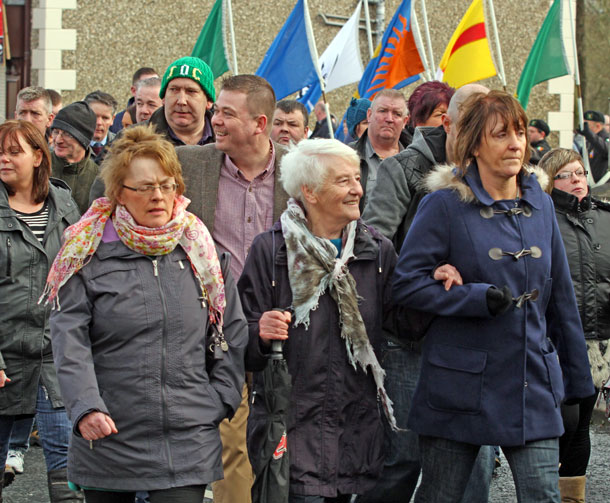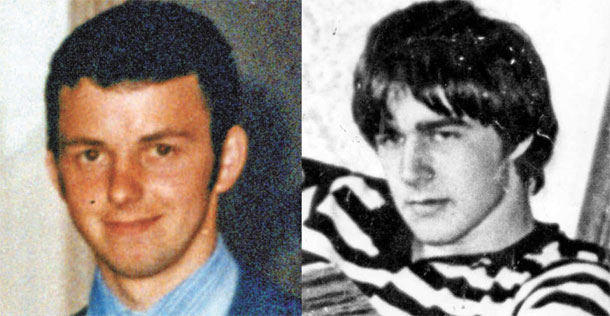2 March 2014 Edition
Young and old inspired by brave Volunteers
IRA Volunteers Henry Hogan and Declan Martin 30th Anniversary Commemoration, Dunloy

• A section of the crowd including Henry Hogan’s sister Maureen, her daughter Margaret and Margaret McErlain
The IRA Volunteers opened fire on two SAS special forces troopers, killing one and seriously wounding a second
VOLUNTEERS Henry Hogan and Declan Martin were shot dead as they confronted a number of British soldiers from the elite SAS special forces near the Hogan family home in Carness Drive, Dunloy, on 21 February 1984.
The Volunteers opened fire on two SAS troopers, killing one and seriously wounding a second.
A third member of the British special forces unit then fired on the Volunteers, wounding them.
As they lay wounded in a nearby field, the SAS summarily executed them.
SAS Sergeant Paul Oram, who was killed in the gun battle, is believed to have been involved in the killing of IRA Volunteers George McBrearty and Charles ‘Pop’ Maguire in Derry on 28 May 1981.
Oram was also responsible for killing unarmed INLA Volunteer Neil McMonagle in the Leafair area of Derry in February 1983; a second man, Liam Duffy, was wounded.
FOR all the ‘old heads’, the old comrades, the long-term activists and the former POWs that attended the 30th anniversary commemoration of IRA Volunteers Henry Hogan and Declan Martin in Dunloy, County Antrim, on Sunday 23 February there were plenty of young people there too.
Whether they were playing in the republican flute bands or attended as activists in the Sinn Féin youth organisations, their presence was welcomed and important to the future of our cause.
Indeed, a number of young people (such as Leanne Peacock from Rasharkin, who will represent Sinn Féin in May’s council elections) talked of how they were inspired by the stories of courage and the legacy of Volunteers such as Henry Hogan and Declan Martin.

• IRA Volunteers Henry Hogan and Declan Martin
The main speaker at Sunday’s commemoration was senior republican Seán Murray.
The Belfast man recounted the courage of the two North Antrim Brigade Volunteers “as they engaged a professional execution squad with inferior equipment and back-up capacity”.
He went on:
“Our focus must rest on perpetuating their memory and the role they played in our struggle. In sustaining that memory we must reach out to a new generation too young to have known our comrades or the conditions that led them to embrace armed struggle at a period in our history when it represented the only effective means of advancing republican objectives.”
Reflecting on the “long and painful journey from the intensity of the armed campaign to where our struggle is today”, Seán Murray asserted:
“The challenge for republicans is to popularise our vision and ensure that the political institutions deliver for our people.
“In peace, as in war, we are dependent on our relationship with our community. Without the support of the people, our struggle will not achieve its objectives.”
With local government and European elections looming in both the Six Counties and the 26 Counties, Murray reiterated the need to increase the Sinn Féin electoral mandate right across the 32 Counties.
He concluded:
“Republicans are about nation building. We are laying the foundations for a new republic, a real republic, with social justice and equality at its core– the republic that Volunteers like Henry and Declan died for.”




